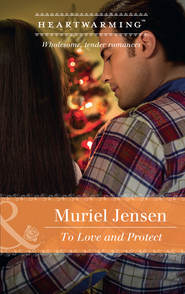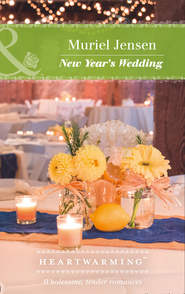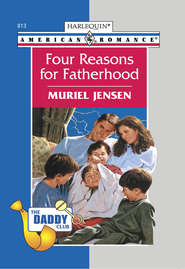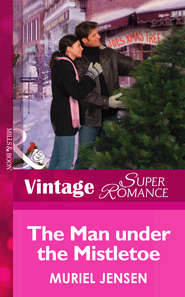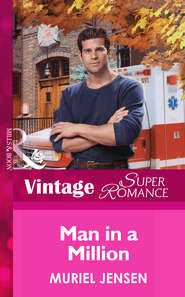По всем вопросам обращайтесь на: info@litportal.ru
(©) 2003-2025.
✖
Man With A Miracle
Автор
Год написания книги
2019
Настройки чтения
Размер шрифта
Высота строк
Поля
“Eighteen. Old enough to be on my own.”
He remembered himself at eighteen, mouthy and brash and confident in his mind and his body. Until he went to college and met better minds, stronger bodies, and felt all his confidence shrivel. He wondered if she’d had to take the few steps back that eventually brought maturity.
“At least, I thought I was,” she admitted after a moment, as though she’d read his mind. “Then I discovered how much parents do for you that you’re unaware of until you have to do it for yourself. And that supporting yourself has a million hidden expenses that keep you too broke to have lunch out, or meet your friends after work for a drink.” She sighed and gave him a frail smile. “And that being alone 24/7 is not the way I want to spend the rest of my life. To remedy that, I spent the year I was twenty-one on a determined search to find a soul mate. I went to a lot of parties, but was selective about whom I dated. But I still managed to get it wrong.
“I had narrowed my choices to two men I really liked. Turned out one was already engaged to a girl in California, and the other got arrested for insider trading.”
He had to smile. “Tough luck.”
She nodded with an answering grin. “True. So I gave up on the search, but I need company, noise, activity. I get so tired of the silence.”
“I came here to find silence,” he said. “After being a cop for twelve years, my head is full of noises I’d rather not hear again.” And after he’d been here for a while, he’d stopped hearing the crash in his head.
She studied him worriedly, and he stopped with a bite of casserole halfway to his mouth. “What?” he asked.
“Is it going to be hard for you to have me here? I mean, I know you invited me to be kind, but you’re beginning to regret it, aren’t you. I can see it in your face. When you walked in the door tonight, I could almost hear your thoughts. Oh, that’s right! She’s here. Well, I’ll have to make the best of it.”
Guilt made him defensive. She was absolutely right. “I thought nothing of the kind,” he denied, “so just relax.”
“I shouldn’t be here long at all.”
“I know that.”
“And I’ll work for my keep.”
“Yes.”
“And I’ll try not to pollute your space—but I sing when I’m working, and sometimes I talk to myself, and I like to have the radio—”
“You’re making a lot of noise,” he interrupted, “promising not to make a lot of noise.”
She sat back in her chair and folded her arms. “So you’re not the sweetheart you pretend to be, are you.”
Sweetheart? “I never pretended to be any—”
“No, I guess it’s not pretense,” she amended, leaning forward again to pick up her fork. “It just seems to come with the chromosome in some of you. You’re all concerned and protective, you offer reassurances in that voice every woman dreams of, then when we begin to believe it, you pull back. Or you’re on to other things.”
That assessment was so brutal, he didn’t know what to say.
“My mother fell for it three times,” she went on between bites, her manner curiously detached considering the intensity of the subject. “We could have gotten along when my father died if we’d leaned on each other, but she kept trying to find the magic he’d put into her life—and it just wasn’t there without him.”
He was beginning to see something here, a possible explanation for her softly spoken assault on the male character. “So…your life was probably difficult,” he guessed, “while she dragged you with her through three marriages and three stepfathers.”
She shrugged one shoulder, as though it didn’t matter. “The second marriage was nothing, really. He was a tennis pro who turned out to be a flake. He was never real enough for me to take seriously. It only lasted five months.”
“And the third one?”
“Almost a year. He drank too much.” She grew quiet.
“But the fourth marriage was different?” he guessed.
A line appeared between her eyebrows as she talked on, clearly lost in memories of her third stepfather.
“I was sixteen and beginning to feel lost because I knew my mother was. Hal was gray-haired and cheerful, and for a whole year things were perfect. They sailed and skied, and we took weekend trips to Buck’s County or the Poconos. He was easy to talk to and seemed to really care about us.” She took a few sips of coffee, leaned her forearms on the table and looked into his eyes. “Then he retired, my mother got sick, and it was clear from the beginning that it would be a long, debilitating illness. I got home from school, eager to share with him that I’d been accepted at Southern Massachusetts University, and he was gone. My mother said he’d told her that he’d worked hard all his life and looked forward to traveling and doing all the things there hadn’t been time for before.”
“That’s rotten,” he said, angry that a man could do that. “I’m sorry.”
She shrugged again. “My mother could have lived a long time. I’d gladly have taken care of her, but she gave up. She couldn’t find what she’d had with Daddy, and it just didn’t occur to her that she had the ability to make her own life worth living.” She added bleakly, “Or that I was still there.”
Now he got the picture. She hadn’t just been young and alone, she’d been betrayed and abandoned—several times.
“And on the strength of the hour you spent with me this morning,” he said, “and the half hour tonight, you’re assuming that I’m the same?”
She pushed her plate away. “You have that look,” she said, “that says you’d really rather not have to deal with me.”
Fueled by annoyance now, as well as guilt, he was vocal in his own defense. “First of all,” he replied, “you’re here, aren’t you? And you wouldn’t be if I didn’t want to deal with you. And secondly, you broke into my office, held me at batpoint, and told me some of your story, but not all of it, because you aren’t willing to trust me completely. And since that story involves a murder and a ruthless chase, you’re surprised that I’m a little wary of you?”
“You offered me shelter,” she pointed out. “I asked you to take me to the—”
“Further proof,” he cut in, “that I’m trying to help. I think what’s bothering you isn’t ‘that look’ I’m supposed to be wearing, but your own insecurities.”
Okay, that had been harsh. He wasn’t entirely surprised when her eyes brimmed with tears and she got up from the table with a wounded look—one that would keep him awake for hours—and ran upstairs.
Some sweetheart he was.
CHAPTER FOUR
BEAZIE WAS FROZEN, and she couldn’t determine where she was. It felt like she was in deep freeze. She was cold inside as well as out.
She must be dying. Tremors racked her, and she wondered if it was possible to rattle apart, for cold limbs to simply break off—the way pieces of your life sometimes did.
Darkness permeated everything, and she swore she could feel her life slipping away. She tried to remember the warmth of love, of belonging, of being needed, but it had been gone for so long.
She began to weep for it. Longing was cold, too, and only served to worsen her situation.
Then she heard the sounds of a car engine, saw headlights in her frigid darkness, then men with guns drawn, coming for her.
Вы ознакомились с фрагментом книги.
Приобретайте полный текст книги у нашего партнера:
Приобретайте полный текст книги у нашего партнера:






